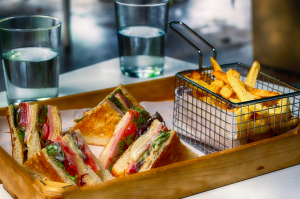When many of us first start new food truck businesses, we don’t know where to buy the inventory we need to make the signature dishes that are going to keep our hungry customers coming back for more. The solution, at first, is simple: When you need food, you go to the supermarket.
It’s actually not a bad way to get started. After all, when you first open your truck, you have no idea what kind of volume you’re going to do every day, you probably have limited capital to buy product in large quantities, and you have, in most cases, a very small amount of storage in which to store ingredients.
Buying groceries off-the-shelf to support your truck in its early stages isn’t necessarily a mistake. However, as your business grows and stabilizes, and you become better at anticipating ingredient shortages and the amount you can expect to sell each day, making the move to a wholesale supplier is an important step to achieving profitability.

Built by M&R Specialty Trailers and Trucks
Shopping for inventory at the supermarket and paying retail price (plus sales tax) is generally much more expensive than working with a restaurant supplier. Plus, unlike shopping for the products you need at the local Stop ‘n’ Shop, when you work with a wholesaler, you’re building a relationship that can be rewarding in the long run; the right wholesale rep can help you plan your orders, anticipate your needs, and may eventually extend credit terms so that you don’t have to pay for everything you buy in advance. Try getting THAT at your local supermarket chain.
When choosing your wholesale supplier, however, there are a few notes to keep in mind. With dozens of different national distributors available, choosing the right one can have a major impact on your business and its growth. Let’s take a look at some specific considerations.
Risk #1: Aiming Too Low

Where will you source chicken burgers?
After a few days or weeks in business, or when you first start researching national distributors, you’ll probably consider a massive supplier like Sysco or US Foods. If your truck is attracting a great deal of media attention, you may even find yourself approached by an aggressive Sysco rep. They’ll promise everything under the sun, in order to get your business: Flexible delivery schedules, a dedicated sales rep, easy online ordering, and possibly even extended credit terms. A browse through their catalog of inventory will reveal low prices on huge quantities of every ingredient you could ever hope to use, making signing with one of these suppliers feel like a no-brainer.
Two items of caution, however. The first is that US Foods and Sysco sales reps work on commission, meaning that their interest may lie more in lining their own pockets, than thinking about the specific needs of your business. You may also find that they tend to push their own house brands of certain ingredients, which they will assure you taste “just as good” as the national consumer brand you’re more familiar with.
During my brief time as a customer of one of these suppliers, their rep would load me up with huge quantities of ingredients that I didn’t need, and more importantly, had no place to store, in order to meet my delivery minimums and keep their commission checks fat.
Ever wonder where you’re going to store ten five-gallon jugs of apple cider vinegar in a food truck with only 10 cubic feet of storage space? It’s not easy, and the cost savings aren’t worth staring at all of that vinegar for six months. Suppliers like these are more well suited to brick-and-mortar locations, who have ample storage space available to take advantage of the cost savings of buying caseloads of product.
More significant, however, is the negative perception that many of your food-savvy customers have of some of these suppliers. In the minds of some of your fans, these big national distributors are synonymous with low-quality, high-volume dreck suitable more for cafeterias and institutions serving sour potato salad out of a 55-gallon drum than creative, artisanal food trucks such as yours.
Having a line of customers see a gigantic 400 foot Sysco trailer pull up in front of your business is such a bad look, in fact, that the company has even made moves to try and disguise its delivery vehicles with a fleet of unbranded trucks. Make certain that the company you choose aligns not just with your values, but with the public perception of your product that you are trying to cultivate.
Risk #2: Aiming Too High

This meal could come from five or more suppliers… Or only one.
At the other end of the quality spectrum sits the high-end, “gourmet” distributors that specialize in organic, free-range, sustainably harvested everything, where a case of sesame seeds will cost you more than a month’s rent on a two-bedroom apartment in a major metropolitan area. As cooks, we all want to use the highest quality product possible, but keep your bottom line in mind when picking and choosing which foods to buy from which distributors.
Working with a smaller, “boutique” specialty distributor may be good for the planet and good PR for your food truck, but for most of us, purchasing all of our product from distributors like these can result in throwing away money on pricey inventory that your customers will never see or appreciate.
Choosing the Profitable Middle-of-the-Road

Built by M&R Specialty Trailers and Trucks
There are a couple of ways to solve this dilemma. Many food truck owners and restaurateurs maintain relationships with multiple distributors. In theory, this can be a great solution: Buy your kosher salt, your garbage bags, and your fryer oil from a company like Sysco, and use the money you save to buy your heritage breed pork, your hearth-baked sourdough loaves, and your fresh produce from a smaller, more specialized distributor.
Depending on the size of your truck and your storage capacity, however, this may not be practical. Consider also that most distributors have minimum delivery sizes, and in the early days of your food truck, you may not have the financial strength to meet these minimums.
Instead, consider choosing a more balanced, middle-of-the-road distributor (Performance Foodservice and United Natural Foods are both great places to start), who offer a range of products at both ends of the quality spectrum, with the right products to suit nearly every budget. Smaller companies like these also tend to fight harder to earn your business, offering dedicated sales reps who are eager to learn the economics of your food truck and help ensure that they are delivering the right product, at the right time, at a price you can afford.
Augment some of your staple ingredient purchases from these companies with local purveyors in your neighborhood, who offer high-quality product, will help support and promote your business, and who will help keep your money in your community. Focus on spending money in ways that your customers will actually see and appreciate, and which will keep them coming back for more.
Note: We are not affiliated with any of the companies mentioned in this post, and we earn no commissions or referrals for our recommendations. In other words, we don’t have a dog in this fight; just an interest in making your food truck purchasing as painless as possible.

Leave A Comment